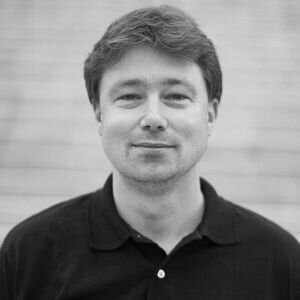Welcome Andrew
by SF Team, 12 September 2018

https://www.flickr.com/photos/duncan/2504910532/
Congratulations to Andrew Lamb, the new Shuttleworth Fellow for September 2018.
Shari Steele, the Honorary Steward for this round, has selected Andrew as an exceptional candidate with tremendous potential to improve people’s lives - particularly those suffering greatly in disaster relief areas.
The Foundation team are delighted to offer Andrew a warm welcome to the Fellowship Programme. We look forward to learning from his contributions and experiences and supporting his journey as a Shuttleworth Fellow.

Introducing: Andrew Lamb
Background: A systems engineer focussed on improving the efficiency and effectiveness of humanitarian relief efforts
Idea: ‘Massive Small Manufacturing’ - decentralising and revolutionising the disaster relief supply chain
Shari Steele, Honorary Steward: “Andrew is a force of nature, and I’m delighted the Shuttleworth Foundation is able to support his important work. Using his engineer’s mind, Andrew problem-solves some difficult issues to bring disaster relief to people around the world. Localised manufacturing will enable relief workers to provide immediate support where it’s needed most.”
The Problem
There is a market failure in humanitarian relief procurement and logistics. When roads, buildings and ports in troubled or remote, low resource areas are destroyed, already-frail supply chains crumble away with them. Aid workers are forced to improvise and face long waits for vital supplies to arrive; often shipped from overseas at vast expense. More often than not, that cost includes the unnecessary and tragic loss of human life.
Death by logistics is the result of an increasingly globalised and centralised manufacturing industry. Humanitarian relief agencies rely on a system built for economies of scale and mass production, in which supply chains are cheap and reliable in wealthy countries but fragile and expensive in developing regions.
Even when supplies get through, it’s a sticking plaster on top of a deeper wound. Communities hurt by natural and political disasters may eventually get emergency help, but struggle to rebuild in the aftermath.
It’s a system many feel is intractable and unchangeable. But new Shuttleworth Fellow, Andrew Lamb, feels differently.
The Idea:
Andrew is an information and systems engineer who has spent his entire career working in disaster relief, humanitarian innovation and international development. With first-hand experience of supply chain failure in disaster zones, his previous experiments in the field have bred an idea that engages a broken system from a new direction and expands the boundaries of what we know is possible with open manufacturing.
What if humanitarian agencies could source high-quality emergency supplies from factories and maker spaces local to disaster areas? Would a focus on localised manufacturing create livelihoods in damaged communities and assist in their economic recovery? And could open source designs, contracts and systems enable a more sustainable manufacturing industry, and help move the dial from centralised production to distributing the means of production?
“I call it Massive Small Manufacturing,” says Andrew. “What I’m doing is about changing the way things are made, encouraging a move away from mass production and towards production by the masses.
“The cutting edge of this idea is in humanitarian relief,” he continues. “Disaster area supply chains are awful - they are so expensive and slow.
“With this idea, you can have a person with a 3D printer on a back of a motorbike in the Himalayas making medical equipment for a clinic that is equal in quality to the mass produced stuff. It is cheaper, faster and earns a livelihood for a local person.”
Localised mass production offers a different challenge. It makes no financial sense for local factories to invest money in retooling equipment for small orders and aid agencies prefer to avoid the complexities of dealing with dozens of supplier contracts.
But if you create a tool that can be moved and used in different manufacturing locations and develop a single contract system used by multiple factories, you might just solve those problems.
“We can take the tool to factories and make 20,000 units in Fiji, 20,000 in the Solomon Islands, and 20,000 in Papua New Guinea,” says Andrew. “You don’t move the products. You move the process.
“I want to open it up to get as many people as possible using it and having a bigger impact. Open is crucial to this - to make equipment designs and contracts freely available online.”
The Fellow
Andrew Lamb: “The Shuttleworth Foundation is the embodiment of the kind of funding the world needs more of. What I’m trying to do isn’t product innovation - it’s a process innovation or a systems innovation. The Foundation allows you to engage in some very complex systems … whereas many other innovation funds are risk-averse.
“It’s a great idea and amazing to be part of it. Tarek Loubani and I have been making similar things with medical devices, and we have been in touch over the past few years. And I’ll be speaking to the other Fellows to get their advice on what they wish they would have done at the start.”
The Foundation
We tend to think of disaster relief as interventions during a temporary state of misfortune. Unfortunately, this is not the case, and some people spend their entire lives in “refugee camps.” Andrew’s approach has the potential to transform communities and environments held back by economic challenges as much as a natural or political disaster.
Andrew brings expertise and an appetite for risk that humanitarian agencies - understandably - cannot have. He has relationships with established organisations, and given the opportunity, his approach could be tested and widely adopted into humanitarian relief plans.
There are many questions around this idea: Will it be more effective than the current systems? What are the environmental and real economic impacts? Will both local users and producers benefit equally? Will skills and technology transfer be required, and can it be done inclusively? Andrew has identified these and many other questions he plans to explore in his investigation. We look forward to uncovering the answers alongside him throughout his Fellowship.